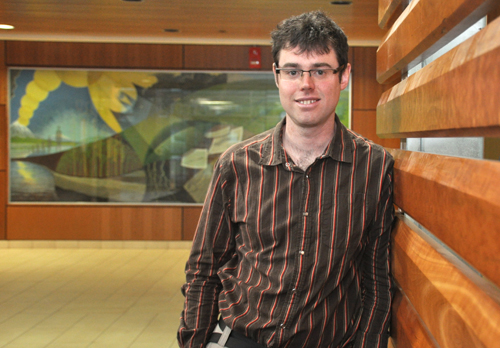
Besides making milk, dairy cattle are also manure-producing machines. According to Statistics Canada, dairy cows generate more manure (62 kilograms per day) than other types of cattle. Proper manure management can help reduce the environmental impact of dairy cows and improve agricultural sustainability, says Jeff Wood, a recent PhD graduate from the School of Environmental Sciences.
Although gases such as methane, nitrous oxide and ammonia occur naturally in manure, they can harm the environment. “There are environmental concerns associated with these gases,” says Wood. “It’s known that agriculture is a source of these gases.”
Both methane and nitrous oxide are greenhouse gases. When ammonia ends up in aquatic or soil systems, it can cause eutrophication (excessive plant growth from too many nutrients) and acidification. A number of aquatic plants and animals are susceptible to ammonia toxicity.
For his thesis, Wood looked at ways to reduce gas emissions from liquid manure storage systems on farms. “One issue is that there are times when farmers have to store manure for an extended period,” he says. “This is because either the land base can’t support continuous spreading or the weather conditions will not permit spreading.”
When soil is frozen, for example, manure cannot be applied because it is more likely to run off the ground. Farmers often store liquid manure until the conditions are appropriate for spreading, but storing it for a long time leads to anaerobic decomposition, which results in gas emissions.
Wood studied the concentration of organic matter in liquid manure, measured by the level of solids, and how that was related to emissions. These solids can be traced back to what the animal ate as well as its bedding material. Higher concentrations of solids yielded higher gas emissions.
His research showed that lowering the amount of solids in manure decreased emissions. “The most practical approach would be solid-liquid separation,” he says, adding that further research is needed to better understand emissions from both solid and liquid components.
He also modelled methane emissions and looked at ways to improve measurement methods. “The modelling aspect is important for two reasons. One reason is that Canada has to prepare national inventory reports that report the annual methane emissions from all sectors. We need to use models for national-scale emission estimates because we cannot measure all the sources.”
Keeping track of methane emissions is important, he adds, but so is being able to predict changes in emissions with climate and different management systems. Emissions are usually higher on hot summer days, for example, and a warmer climate could cause increased gas production in a liquid manure storage system.
Wood compared emissions predicted by two models — one empirical, the other mechanistic. The empirical inventory model is easier to apply to many farms, he says, because it uses readily available data and is more suitable for a national inventory. Mechanistic models are more complicated, because they require more input data. But they are often more accurate, which makes them particularly suited to performing detailed scenario analyses. “I was validating an existing inventory model. With the mechanistic model, I modified an existing model to make it more appropriate for farms before performing the validation.”
Wood says he has always been interested in environmental sciences. His master’s research investigated wastewater treatment systems for dairy farms. “For my PhD research, I was interested in learning more about the gas emissions side of it, because water and air quality issues are often related.”
In April, he successfully defended his thesis on mitigating gas emissions from manure. His co-advisers were Profs. Robert Gordon and Claudia Wagner-Riddle.
Funding for the research was provided by the Natural Sciences and Engineering Research Council and through the Ontario Ministry of Agriculture and Food and Ministry of Rural Affairs/U of G partnership.